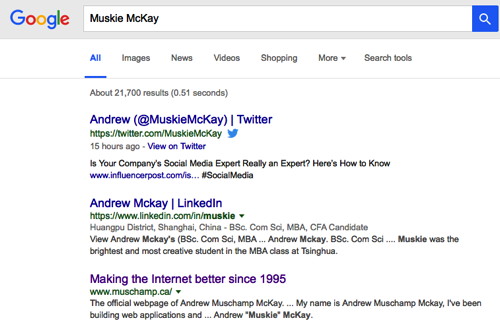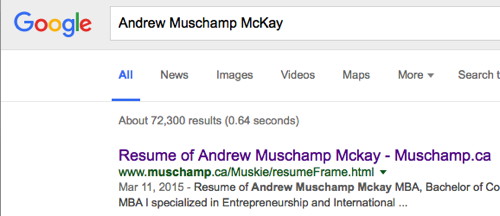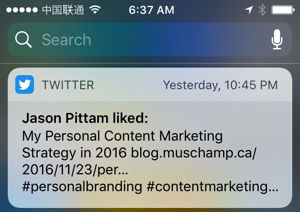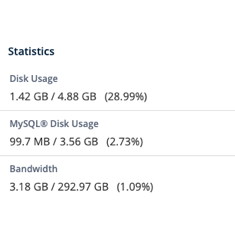Personal Content Marketing Strategy
November 23rd, 2016
My ongoing job search lately has lead me to do a lot of Googling and a lot of lying in bed unable to sleep, which sometimes leads to me getting up and sitting in front of my computer more. There are a lot of self proclaimed experts online, some of them actually know what they are talking about, some of them just talk a lot. Separating the wheat from the chaff is still a billion dollar problem online, as someone who continues to spend too much time online, here is how I manage my personal social media firehose.
Full discloser, I’m old, older than the average social media expert. So if I’m not using the latest greatest trendiest techniques, well I apologize, I tend to stick with what works.
Source VS Distributing Content
There are two sides to the content marketing strategy coin, sourcing your content, and distributing the content once you have sourced it. Distribution has gotten easier and easier, it can be automated, there are lots of apps and web services you can use. What is more interesting and more important from a branding standpoint is where do you get your content and how to you continue to come up with content related to your brand?
Obviously you can produce your own content, some social media experts advocating writing a 1000 word blog post every day. Most people however also repurpose other people’s content and share it. Sharing will be my focus as I have been refining my personal social media strategy over time.
My distribution networks of choice besides still occasionally writing on my blog are Twitter and Pinterest. I of course use other social media networks and Klout gives me a disproportional amount of my score from Instagram, but I didn’t accidentally make 20,000 tweets. The recent US presidential election has confirmed Twitter is still a very effective means of distributing information and misinformation.

I currently do not automate anything for my personal social media accounts, while I’m sleeping, I’m not tweeting, I also keep my phone far from my bed to cut down on impulsive actions and hopefully improve my sleep. If something is keeping me awake at night, I have to get up out of bed to connect to the Internet. Remember you do not have to post right away. I email stories to myself which are then automatically sorted to be read later by my mail client, I keep lists of topics to research and eventually perhaps write about. Sober second thoughts are not thought enough. I can’t stress enough the importance of re-reading an email or a post preferably a few hours after you first write it. This may not help you scoop the world, but it can help you avoid some problems and improve the clarity of your thought. I recommend doing a lot more proofreading than most people do before hitting send or post or tweet.
Damage once done, can be impossible to undo.
Where do I source content?
Well, besides Twitter and Pinterest, again full disclosure, I do a lot of re-pinning, retweeting, and of course liking, I get relevent content from Flipboard, which won my personal news app sweepstakes. I also still use RSS, Google Alerts, plus a few trusted web sources, but more and more Flipboard is where I get my news on my mobile phone. When I’m in front of my personal laptop, I have many more options, one of which is of course Google itself, but more and more people are on the go with just their mobile phone.
Update: since I upgraded to iOS 11 I can no longer tweet stories from the Flipboard app and I am not happy about that. It could be the VPN or the Great Firewall but I can share stories via other means and I can still tweet from inside China. This however is not my biggest problem, I still have not found a better job and I’m tired of looking, applying, and interviewing… so stop reading this and view my resume.
You are your Google Results
The content you choose to share affects your personal brand online and thus your career prospects. You can still ‘like’ cat pictures, or gym selfies, or retweet your favourite celebrity or expert you follow on social media, but if you’re at all serious about your personal branding you must share content that you want associated with your name when employers Google you. For instance my latest tweet(s), not retweets or replies, but actual tweets usually show up at the top of my Google results for Muskie McKay, so be careful especially if you are actively job searching.

They do not show up for Andrew Muschamp McKay which is a personal branding problem I may never overcome. Some people have mentioned my nickname, which I’ve had from birth, is unprofessional, so I long ago started de-emphasizing it especially in my job search, but most people who have known me longer than ten years still call me “Muskie” or “Musk”, once you get a nickname, it is hard to lose it, and shockingly we still do not give personal branding advice to primary school children or young parents, though some celebrity children undoubtably have personal branding consultants. I’m sure regular parents park domains or reserve social media accounts for their children nowadays too.

Search Engine Optimization can help
By using this domain plus various SEO techniques such as rel=”me”, my first page Google results are OK. I am able to sleep at night even knowing my personal branding is not optimal due to decisions made by my parents before the world wide web was invented. I also have to live with the fact I’m still too honest for my own good, this does bothers me. However what really keeps me awake at night is my inability to get jobs I want. So I read a lot of expert advice online and I’ve become more strategic in sharing expert advice in order to improve my personal brand online.
Measuring Social Media Influence
One way I’ve taken to tracking the success of my personal branding efforts is Klout. It is much maligned and people are no longer obsessed with it, but if you diligently source content, carefully tag it, and distribute it, you can measure your success by whether Klout and social media in general deem you an expert on that topic. Or you could until May 2018 when the system will be shut down, but fear not, in June 2018 Kred 2.0 will be available. There are of course other ways to measure success, both Twitter and Pinterest have analytics, you can use Google Analytics, and you can of course use vanity metrics like the number of followers you have on Pinterest or Twitter, but lately I’ve been reconsidering Klout.
How important is LinkedIn?
Considering it’s importance in the modern professional job search, LinkedIn and whether you have endorsements, either written endorsements or the quicker less sincere single button click endorsements is something I should perhaps pursue more. Alas I just don’t have much time for networking, personal branding, blogging, social media, or even my job search as I continue to fall further behind in my self imposed study plan. I will be using the last of my vacation days this year to try and catch up.
Demonstrate Expertise
I still continue to try and improve my expertise on relevant professional topics like: analytics, e-commerce, and project management, not to mention financial analysis as confirmed by Klout. However if you really want Klout or vanity metrics to increase you need to use hashtags repeatedly on Twitter that other people actually care enough to follow. I also recommend building extremely well curated ‘pin boards’ or using some other content aggregation system such as scoop.it or better still your own web domain. Which hashtags you target makes a big difference, I’m not one to advocate highjacking trending topics, better to stick with hashtags that consistently prove popular, these ones have worked for me include:
- #socialmedia
- #analytics
- #ecommerce (without the dash because you can’t have a dash in a Twitter hashtag)
- anything marketing related
Twitter Bots Validate Strategy

I tweeted this post exactly once, at whatever random time I finished it in China and it got several retweets, likes, and I got several new followers, all because I chose three good hashtags. I don’t think this is my best post ever, just my latest. The hashtags I used were: #personalbranding, #contentmarketing, and #socialmedia. Not only do real people care about marketing related hashtags, but I suspect there are now a large number of bots being used by online marketers. Choosing a keyword rich post title is always wise when blogging.
So you want to be popular?
If you really want to be popular you will have to give more thought to using something like Buffer or Hootsuite to automate your social media posting. The time of day you post definitely matters, for my personal account I tend to not automate and to post as soon as I find new content I want to share, the more professional social media content strategy is to automate and post at peak times for each network. Sometimes, the first person to tweet or blog on a topic still wins, even if they are not professional, optimal, or even correct.
This really must be my last blog post for a while, I’m not trying to be popular. I’m trying to pass all the CFA® exams. But we shall see if through diligent use of hashtags and social media I further improve my Klout or better still my job. I have continued to improve this blog. My efforts include editing old posts like this one to try and make them more professional if not optimal. I’ve also decided to up my search engine optimization game even further, evening redoing my taxonomy yet again. I can’t say it has been a big success, but I do sleep well most nights because I know how much I’ve tried and I know I continue to tell the truth. If you have any thoughts you can leave them below.
This entry was originaly posted on , it was last edited on and is filed under: Personal Improvement and tagged: Marketing, Personal Branding, Social Media.





One CommentLeave A Comment Now